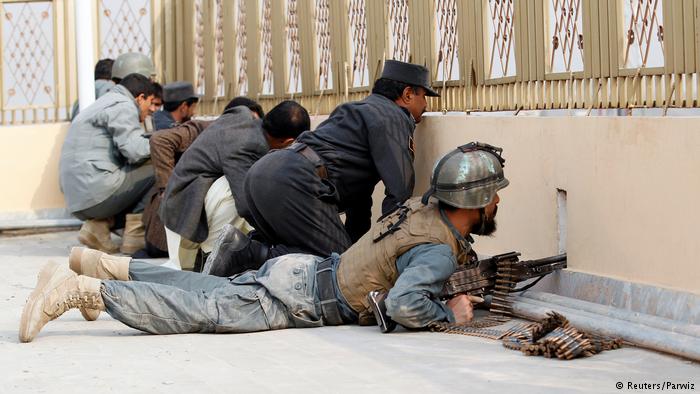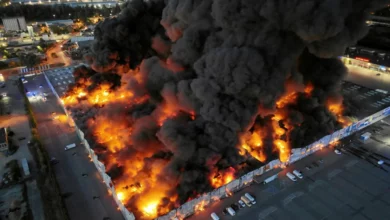
The wording alone suggests the gravity of the situation. Until the end of 2014, the German government’s regular dispatches on Afghanistan were called “Progress Reports.” Now they are simply called interim reports, or in this case: “Government Report on the Status and Outlook of German Engagement in Afghanistan.” The word progress is nowhere to be found.
According to the 26-page paper outlining the framework of Germany’s military and civilian engagement in Afghanistan, the security situation in the country has deteriorated substantially since the withdrawal of NATO forces in December 2014.
That means that the security situation is so poor that it has become impossible to effectively provide civilian assistance. The report suggests Germany is only providing civilian assistance in “safe and accessible regions” — however, it doesn’t specify which regions are, in fact, safe.
Most German aid workers in Afghanistan live in the capital, Kabul, and the northern provincial capital, Mazar-e-Sharif — protected by high, concrete blast walls that cut them off from the civilian population.
Last May, the German Embassy in Kabul was destroyed in a massive bomb attack. Currently, the German ambassador and his team are guests at the US Embassy. Back in November 2016, the consulate general in Mazar-e-Sharif was so heavily damaged by a Taliban bomb attack that it could no longer be used. Consulate employees, as well as personnel from the German Society for International Cooperation (GIZ), have been living at the Camp Marmal German military base since the attack.
Lack of protection for military trainers
The report casts a stark light on northern Afghanistan, which has been under the special protection of German soldiers since 2003. Currently, the German army stations a maximum of 980 soldiers in the region. Yet, “rising threat levels for international forces including the German army” have made it necessary to deploy more soldiers to the area, with the limit to be raised to as many as 1,300 soldiers. In a recent newspaper interview, German Foreign Minister Sigmar Gabriel voiced support for the move.
The situation has kept the German army from conducting “as much as half” of its planned military training for the Afghan army. Now, German army officers training Afghan forces are accompanied by armed German soldiers to protect them against potential attacks by Afghan trainees. When German trainers are training low-level Afghan forces rather than higher-ranking officers, says Gabriel, “we will need more soldiers to ensure the protection of our own soldiers.”
‘Strategic stalemate’
The new report lays the blame for the Afghan “security vacuum” on the hasty withdrawal of NATO troops at the end of 2014. It notes that it wasn’t until late 2016 that Afghan security forces, with international support, were able to “achieve the stabilization of a strategic stalemate.” It also points out that Afghan security forces and police have largely withdrawn from rural areas in order to concentrate on “protecting population centers.”
Hence, Afghan forces are under so much pressure they are unable to protect their entire country from rebels and terrorists. They have surrendered rural areas in an effort to defend the state itself in urban centers such as Kabul, Kandahar and Kunduz. Despite that, major cities have repeatedly been the target of deadly terror attacks. Just this January, an ambulance packed with explosives was detonated in the heart of the Afghan capital, killing more than 100 people and injuring more than 200, some severely.
Deficient government development
Billions of euros have been sent to Kabul since 2001, yet Afghans are losing faith in their government. The current administration is rife with internal divisions, something this latest German government report fails to mention.
One sentence, however, gives insight into Germany’s take on the Afghan government: the protection of human rights “is being impeded by a general preference for Sharia law, a lack of a unanimously accepted interpretation of the constitution and an effectively weak justice system.”
That means might equals right in Afghanistan today; there is no functioning rule of law that the country’s citizens can put their faith in. Added to that the fact that Afghanistan’s economy has collapsed since the withdrawal of more than 100,000 NATO soldiers, and it’s no surprise that Afghan citizens are fleeing their country in massive numbers — something that directly affects Germany.
Refugees and economic immigrants
The report concludes that “Afghanistan is one of the world’s main exporters of refugees.” The reasons for this are “above all, unsatisfactory economic development and corruption, the security situation and population growth.” It’s conspicuous that economic development appears first in that list, with the lack of security coming second. Germany has been looking for ways to further justify deporting people back to Afghanistan. Refugees must be protected; economic immigrants do not.
According to official statistics, some 250,000 Afghan citizens are currently living in Germany. Of them, 15,000 are slated for deportation. Germany has deported 155 Afghan men since December 2016. At the moment, only criminals and people who have attempted to hide their identity are being deported. The fundamental question of whether it is legal to deport a person back to a country experiencing war remains unanswered.
Bottom line
The report urges “strategic patience” and provides no blueprint for a withdrawal of troops, meaning Germany must prepare itself to remain in Afghanistan far into the future. In the end, the report claims that “abandoning military or civilian engagement in Afghanistan could set off a chain reaction with unforeseeable consequences.”




